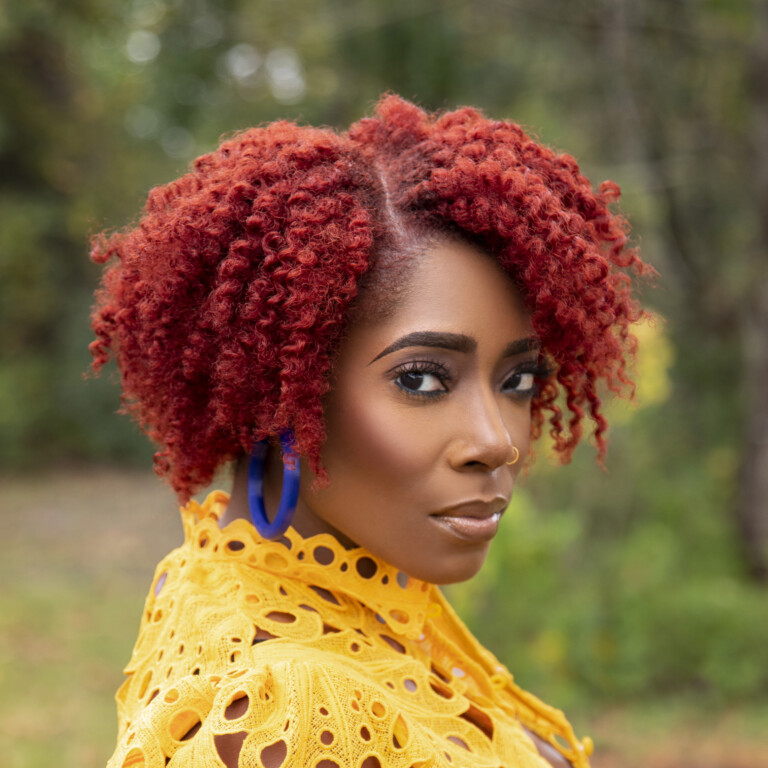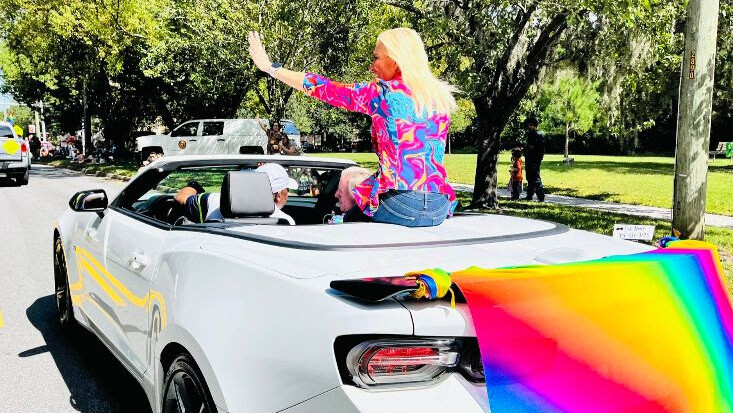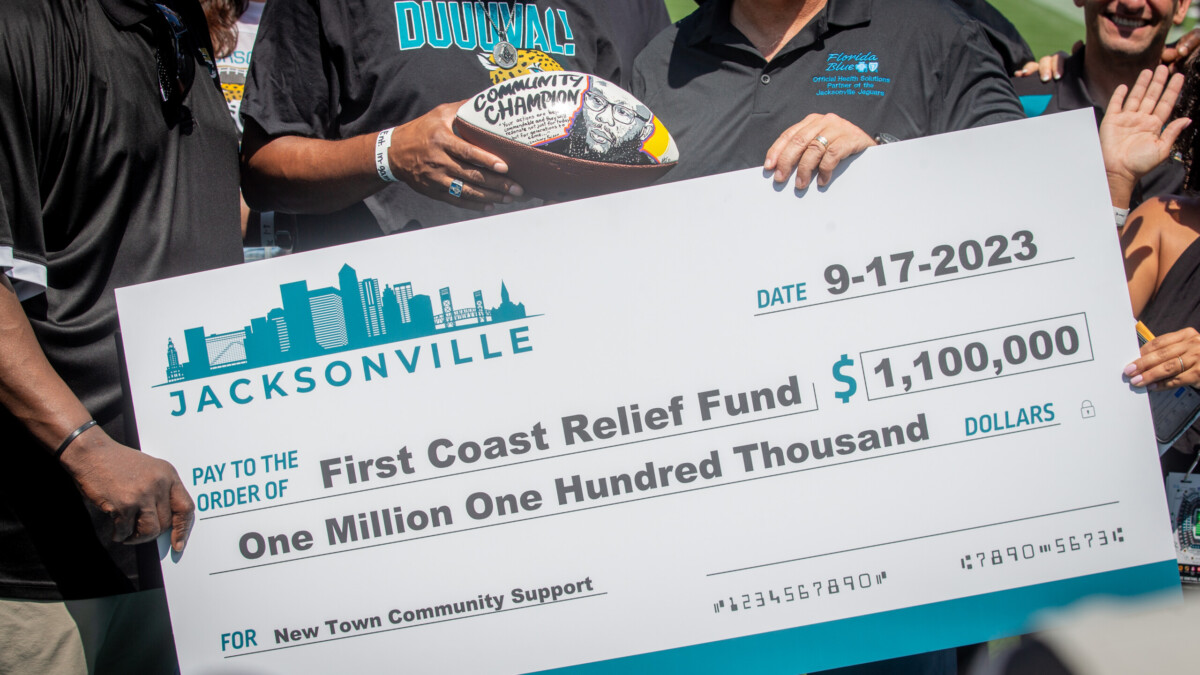
The image of Le’Keian Woods’ beaten and bruised face lives rent free in my mind. His eyelids purple and swollen shut. His bottom lip and chin busted and bloody. Every time I read updates to his case and I see the accompanying mug shot of his face I say to myself, “My God.”
This is juxtaposed to the recent image of Mayor Donna Deegan serving as grand marshal in the Jacksonville River City Pride Parade, her blond hair flowing down the back of her multi-colored blazer containing all the hues of the pride rainbow flag that hung from the back of the white convertible she rode astride.
With one image I am reminded of the police brutality that is allowed to continue, not only unchecked but deemed an appropriate response to a man who had been stunned twice before four officers beat him and arrested him. With the other, I am grateful that the mayor of our city felt it was important to acknowledge the humanity of our queer community at a time when homophobia and transphobia run rampant in Florida through enacted legislative policy.
I’ve been trying to find the connection between the two images for days, the complex narratives they contribute to about race and gender and sexual identity. The images, while very different, offer damning commentary on who and what we value. Who deserves protection and who doesn’t. Who is worthy and who is not.
See Woods’ mug shot in this story from First Coast News.
The ease with which Le’Keian Woods’ injuries have been dismissed as routine and an example of a use of appropriate force for when a person resists arrests bothers me. Hogs hauled off for slaughter aren’t treated this badly, and yet I’m grateful that Le’Keian Woods is alive. That his mother, Natassia Woods, can call and demand of both the mayor and sheriff better treatment for her son while he is in prison instead of picking out a suit, tie, and casket.
Too often both the lives and deaths of those we deem unworthy, undeserving, and without value don’t even make the footnotes of history. The people vilified as gangbangers and drug dealers, stereotyped as aggressive super predators, a whole generation demonized as crack babies, are systematically written out of our lexicon, their names replaced by behaviors, their humanity diminished in favor of labels to make us remember what they did instead of who they were.
The same happens to the queer community. No sooner than the image of Mayor Deegan at the parade hit the internet did the political opposition attach the narrative of the queer community’s “sexualizing children” because sex toys were sold at booths during the pride celebration, and condoms may have been thrown from a float. While the movement for marriage equality grounded itself in the message that “love is love,” it was born out of a movement for queer communities to receive the same civil rights as all other people in this country amid the ravages of the AIDS epidemic that began in the late 60s and reached its heights in the 80s and 90s.
Pride events harken back to the history of Stonewall and the prescient presence of Black and Latiné trans women—who led that movement—to be seen as women, human, worthy and valuable. While many pride events are whitewashed by buff bros in booty shorts, the demand that the queer community reckon with its own racism and transphobia is ongoing.
The image of Mayor Deegan leading the parade communicated to me that while there is pride, acknowledgment, diversity and inclusion, there is still work to be done to create equity. Similarly, the image of Le’Keian Woods communicates that there is still work to be done for Black people who cross paths with the carceral system to still be seen and treated as people.
Too often marginalized communities have to justify their humanity. When the story broke this summer about Braxton Smith being pulled over, harassed, searched and detained by JSO in November of last year it was noted before Smith’s own name that he was a veteran. A signifier that he should have been treated differently than what his skin color denoted.
When Laphonza Butler was sworn into the U.S. Senate, taking the seat left vacant after the death of California Democrat Dianne Feinstein, it was noted she was the first Black lesbian woman to take the office. A signifier that despite her difference she was worthy.
When we remark on the exceptionality of marginalized people, their race or ethnicity, their sexual or gender identity, their status as a veteran, the universities they attended, the credentials they have acquired, we are doing so to demonstrate their value in comparison to a standard set by white men—who remain at the head of all power structures—who are assumed intelligent and superior due to social constructs and the enforcement of discriminatory laws for centuries.
For this reason, Le’Keian Woods’ arrest can be casually dismissed as appropriate because he bears none of the exceptional signifiers needed to make his life matter to more than his mother. And because he did not die, his life cannot take on the lionization that senseless Black death often does to become the face of a movement from which the victims — eulogized by the likes of Al Sharpton and canonized along with Martin, Malcom, and Medgar — will no longer benefit.
Similarly, Mayor Deegan’s role in the River City Pride parade can be hailed as a monumental occasion, despite the right-wing backlash, because it carries all the signifiers of exceptionality that matter to those who keep score in history.
But what we are witnessing in the images of Woods and Deegan, the degradation of one, and the praise of another, is how much we allow differences to separate and dictate unequal treatment and how much further we have to go before equity in policing, in education, in health care, in civil and human rights matters more than skin color, how we identify, the God we worship, or who we love.
There is still much work to be done.
Lead image via Mayor Donna Deegan via X

Nikesha Elise Williams is an Emmy-winning TV producer, award-winning novelist (Beyond Bourbon Street and Four Women) and the host/producer of the Black & Published podcast. Her bylines include The Washington Post, ESSENCE, and Vox. She lives in Jacksonville with her family.






